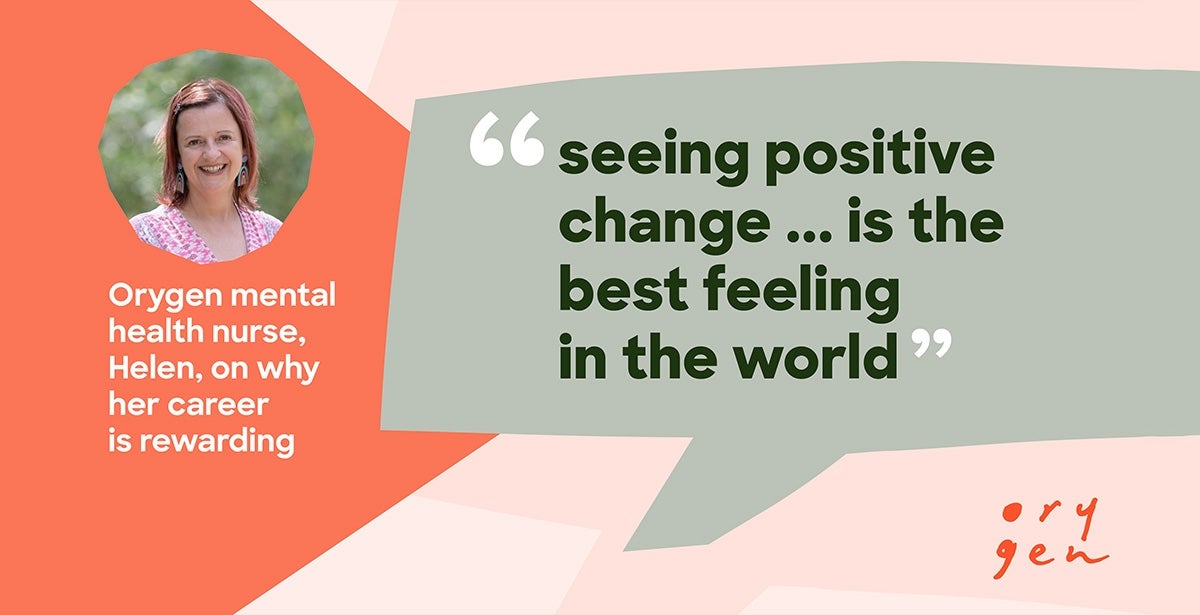
10 reasons why working in youth mental health is rewarding
Working in youth mental health has never been more important, with nearly two in five young people reporting experiences of mental illness in the last two years. Unsurprisingly, demand for mental health services has also skyrocketed since the pandemic.
That means there are plenty of opportunities for job seekers. But is this career right for you?
Helen Nicoll is a mental health nurse and cognitive behavioural therapist with 25 years of experience. She has worked predominantly in supporting young people with psychosis and delivering trauma therapy with the military.
“I have experience working with deaf people in inpatient forensic units, alcohol and drug detox, forensic mental health and psychological therapy for people for everything from hoarding, flight phobia, psychosis, severe depression, agoraphobia and pretty much everything in between,” Helen says.
We sat down with Helen as she shared 10 reasons why a career in youth mental health care is so rewarding.
1. It is never dull
Having a career in youth mental health means you can work with a range of people in different settings, each with their own circumstances, challenges and questions. Helen is passionate about this work.
“One of the things that I love about this work is that it is never boring,” Helen says.
“Whenever I think I have heard every story going, something I have never ever thought of comes up. The conversations I have heard over the years will always stay with me and have shaped who I am as a person and as a clinician.”
For mental health nurses like Helen, the insight she gets into people’s lives is significant. “It is a true honour to hear about people’s journeys and stories, what makes them tick and how best they can move their life in a direction they want to,” she says.
2. Your career in mental health has many pathways
Fancy being a researcher? A counsellor? A clinical leader? A writer? A clinician working with deaf people in a forensic unit? When you become a worker in mental health services, the pathways are virtually endless.
Working in the mental health sector offers a diverse range of careers, including roles in counselling, social work, nursing, occupational therapy, psychology, psychiatry and more. Even within a profession, you are likely to see variety based on the individual’s specialisation.
In her own 25-year career, Helen worked clinically in many different services before working as a clinical consultant across the Australian Early Psychosis Program and the wider Knowledge Translation team.
“I am not sure even I could list every pathway,” Helen says. “Amongst my colleagues, I know mental health nurses who are leaders, academics, educators, advanced clinical practitioners, prescribers and translators of knowledge into clinical practice.”
3. Be part of a supportive team
Having colleagues who put the team and each other first is a vital part of any workplace, but especially one as challenging as youth mental health. Helen says she has felt supported throughout her career and especially her eight years at Orygen. “I consider my team as part of my family,” she says.
“Over the past 25 years, I have noticed that my colleagues always tend to have an interesting story, a humbleness and a willingness to support each other as well as our clients. I have always felt that my colleagues ‘have my back’ and are always willing to stop what they are doing to give me a hand, the time to reflect, a space to shout or scream and always with vegan chocolate.”
4. You can drive positive outcomes for people in need
Having a family thank you for saving their child can be overwhelming, but it is a real part of the experience of working with young people in this field.
“Seeing a young person in distress is difficult,” says Helen. “The journey to their recovery can be slow and feel tiring for them and you. But when you start to notice positive change through your outcome measures and reports from family, and you are seeing the small things shift, it is the best feeling in the world.”
5. Clinical work will give you memories for life
Whether it’s times of laughter and chatting, or discussing strengths and hopes for the future, Helen says she has inspirational stories from her work with young people that last forever.
“I remember being given a small plastic flower from a young person who hadn’t left the house for a year but was able to walk out the door to buy a plastic flower,” Helen says. “That is literally enough to keep the job satisfaction in check for years.
“My favourite memory is when a client dedicated their PhD to me. What an absolute honour!”
6. It can open the door to travel
Working in youth mental health may allow you to lend your skills further away from home. Skills are needed in many areas due to limited resources, so workers in youth mental health can be lifesavers. Travel is also a chance to witness incredible work and learn how other countries organise mental health services.
“I have been lucky enough to work in three continents and have visited many other countries to support organisations with strategic mental health support, service improvement and workforce development or training,” Helen says.
“I have found myself watching dolphins in Whyalla, tasting beautiful ‘posno’ food in eastern Europe and hanging in the Californian desert after a day of clinical training.”
7. Families welcome you into their home
One of the best parts of having a role in mental health services is being invited into families’ homes and lives, hearing their fears, supporting their hopes and talking with them about their experiences.
“Being able to talk through how they are doing and engage with them on all levels is important, but also something where we can see such great work happening,” Helen says. “The times we walk away from a family knowing that they have a toolkit of how best to support their young person is just fantastic.”
8. There are always new skills to learn
Having a career in youth mental health means you are continually learning. In this evolving field, no two days are alike and working with a variety of people means they each have their own challenges and concerns.
For Helen, students in the field are a great source of learning. “I always give students the opportunity to ask us why we do things and share creative ideas,” she says. “Students are best placed to know the latest evidence and have fresh ideas. After 25 years working in mental health, I still learn every day.”
Listening to new students is also an important boost for them. “I still remember the first day a psychiatrist asked me my opinion on a person we were working with and I was only halfway through my mental health nursing course,” Helen says. “I felt so valued and have done it ever since.”
Mental health workers are also often collaborating with a range of other professionals, such as nurses, social workers, counsellors, psychiatrists or psychologists. This offers even more opportunities for learning.
9. There is always an opportunity to connect with others
Working in youth mental health means you can understand other people’s stories, help them on their journey and collaborate on their goals.
“People have interesting lives. It is great to be a part of them and to hear more from people about what makes them tick,” Helen says.
10. There is substantial evidence to show that mental health work is actually helpful
Adolescence is a critical period for developing habits—including emotional and social habits—that can last a lifetime and most mental health disorders begin in the transition to adulthood. This means that mental health professionals can have a significant impact on young people by connecting them with help and support.
While youth mental health is an emerging field, there is wide agreement among professionals that early specialist intervention can make a crucial difference in reducing the severity and duration of a young person’s mental ill-health.
“While the work feels rewarding at times, knowing that there is a lot of research and clinical practice happening reminds us that there is a really solid and valid reason for this work,” Helen says.
“That also helps us to work out what interventions should look like, how services should organise their work and resources. This has the potential not only to reduce the burden of illness on young people and families but also reduce the cost of illness on the economy.”
Helen Nicoll is a mental health nurse and cognitive behavioural therapist with 25 years of experience. She currently works at Orygen.
You can drive a positive impact with VU Online’s Master of Child and Adolescent Mental Health. Commonwealth Supported Placements (CSP) are available for new and eligible students for the Graduate Certificate in Child and Adolescent Mental Health. This qualification comprises the first four units of the masters degree. To learn more, call our team on 1300 682 051 or email futurestudy@online.vu.edu.au.
-
View previous article
 How to improve mental health in schools25 October 2023
How to improve mental health in schools25 October 2023 -
View next article
 What is an NGO? How to make positive change31 October 2023
What is an NGO? How to make positive change31 October 2023

